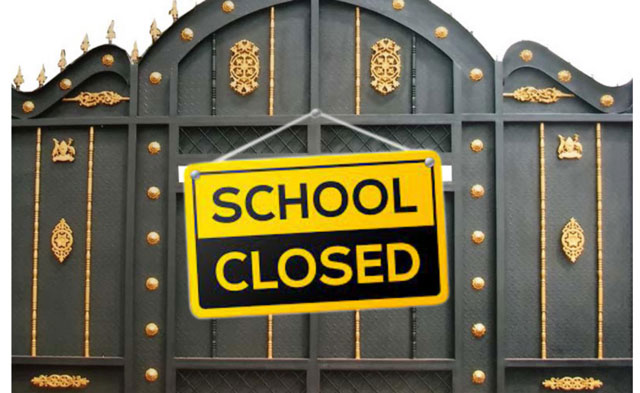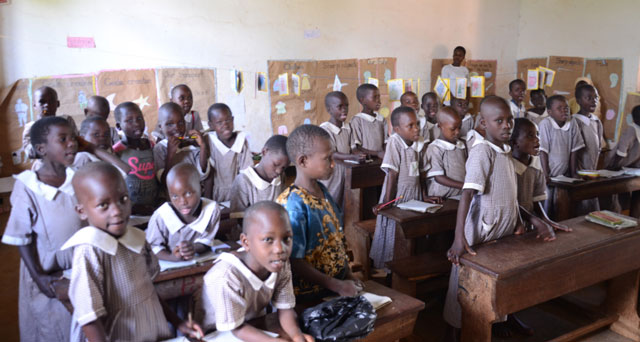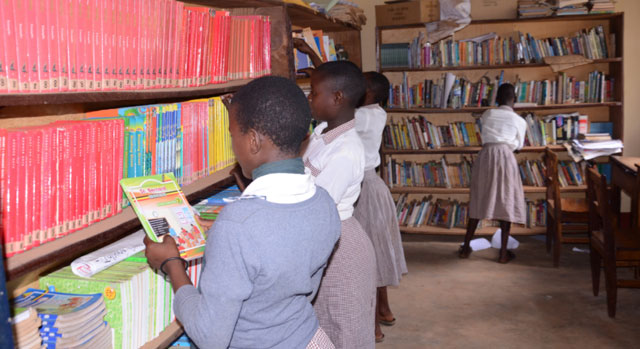
Teachers: How Museveni’s strategy is failing
COVER STORY | MUBATSI ASINJA HABATI | Non-science teachers in government secondary schools across the country, their primary school counterparts, and tutors in teacher training colleges who are on strike demanding unbiased pay appear to have President Yoweri Museveni cornered.
Although the President is talking tough, the teachers appear to have been toughened by the two-year COVID-19 lockdown and are not backing down.
But that also means, parents and learners are confused as there appears no clear way out of the unending strikes.
The current one was sparked when, based on President Museveni’s wish and command, the Minister of Finance, Matia Kasaija in the FY 2022/23 national budget raised the salary of secondary school teachers of science subjects by between 300 to 300% and left the other teachers gnashing.
Science teachers had laid down their tools since the second school term opened on May 09 demanding fulfillment of the government pledge to enhance their salaries.
The science teachers scored a major victory when the Ministry of Public Service on May 18 indicated that their salaries, together with other of scientists, would be enhanced with effect from July of 2022. On May 20 the leaders of the Uganda Professional Science Teachers Union (UPSTU) announced in Kampala that they were ending a strike.
Based on their agreements, the salary for secondary school science teachers, who are degree holders, is expected to increase from Shs1.2 million to Shs4 million while that of diploma science teachers is expected to increase from Shs950,000 to Shs3 million.
Currently, the arts teachers, who are degree holders, earn a monthly salary of Shs1, 080,000 while diploma holders in secondary schools earn about Shs795,000.
Meanwhile, a primary school teacher in a government school and on pay roll gets Shs500,000 gross salary and a head teacher of a primary school gets Shs700,000 per month.
These salaries are not changing, according to the budget read on June 14.
Top teachers want Shs12 million
But one day after the budget reading, on June 15, the teachers whose pay was not increased under their Uganda National Teachers Union (UNATU) declared a nationwide strike, which as we write is in its third week.

UNATU proposes that the highest paid teacher at the National Teachers College be paid Shs12 million per month and the lowest paid teacher in a primary school be paid Shs1,350,000. In UNATU’s proposed salary structure, they agree that science teachers be paid comparatively more than the arts teachers. At secondary school level, UNATU proposes that senior science teachers be paid Shs6 million as the arts colleagues get Shs5.4million.
The UNATU position is not very different from that of the spokesperson of Ministry of Education and Sports, Dennis Mugimba. He says President Museveni emphasised that the salary gap between arts and science teachers should be minimal.
“If a scientist earns Shs5 million, the one of arts should not earn Shs2 million. The latter’s salary should be around Shs4.5 million,” Dr Mugimba says.
But the Ministry of Education and Sports insists that the President’s position is that scientists’ salaries be given first priority.
Parents confused
The continued closure of most schools, especially in rural areas, has left parents confused. Many are worried that their children will not catch up with time lost during the two years COVID-19 pandemic lockdown; the longest in the world.
“Because of this strike our children are like in lockdown again,” said a parent who has children at Katebwa Primary School in rural Bunyangabu district in western Uganda. It also means that, once again, the learning syllabus; which is already abridged because of the COVID-19 locked down, will not be completed.
The parent added: “”Museveni is getting very old and tired; how can he increase salaries of science teachers and leave other teachers. Are those teaching arts not imparting knowledge?”
Located deep in Rwenzori Mountains in Bunyangabu district, Katebwa Primary School is among the many rural UPE schools at the bottom of performance in national exams. When we visited, it was closed and deserted. No teacher was present; not even the head teacher.
This school is one the few government-aided primary schools in the mountainous sub-county of Katebwa in the newly created district of Bunyangabu that was curved out of Kabarole district. Teachers at this school are among the thousands of others that have heeded UNATU’s call to lay down tools.
Peace Mutuzo, the Women’s MP for Bunyangabu District says government’s long term strategy is to make Uganda an industrialised country but that can only be achieved by making a deliberate move to train scientists.
“Government wants to popularise science subjects. That’s why they are paying science teachers highly compared to teachers of art subjects. The reasoning of Government is that this strategy aims at encouraging students to like and learn science subjects,” says Mutuzo.
“To achieve this, government has started by paying science teachers higher first and arts teachers will follow next year,” says Mutuzo who is also Minister of State for Gender.
Katebwa Primary School, like most rural schools under the government’s Universal Educations programs; UPE and USE, relies on the government to pay teachers.
The case is a little different in public schools in urban areas which have both government paid teachers and teachers paid from money collected from students by school Parent Teachers Associations (PTA). Schools with PTA teachers have remained open.
“Had it not been for PTA paid teachers the school would have closed just like others in rural areas,” said the head teacher at Buganda Road Primary School.
More strikes coming
Members of UNATU say they are protesting against the delayed increment of salaries of government teachers as agreed upon in 2019. To this they have added what they call the discriminatory salary increment to science secondary school teachers only.
A few years ago, the government decided to increase salaries of scientists, including science teachers, as a motivation to stay on the job and not to leave for ‘greener pastures” or countries that are giving better pay. Up to Shs735 billion has been earmarked in the budget for enhanced pay of scientists.
But the strategy appears not to be rolling out according to plan.
During the science teachers strike, the arts teachers kept teaching and primary schools and teachers colleges did not close by then.
But this time round most government schools are closed. This is partly because most schools have more arts teachers than science teachers. It implies that learners lose out more when arts teachers strike.
The leaders of science teachers at national level, such as the National Coordinator for Professional Science Teachers Union, Ramathan Katende, say the science teachers who do not subscribe to UNATU will continue to teach.
Indeed, in some government aided secondary schools, science teachers have continued to teach.
“Why would someone announce a strike during this period? It looks like they are sabotaging our hard earned increment. Our colleagues could have joined to celebrate with us because we have set the bar high for their future negotiations,” says Katende.
He argues that the Shs4 million starting salary for science teachers is not high pay for professionals since there are government workers who are earning much more than that.
“We are not against increasing salaries of arts teachers but they should use better negotiation means,” he says.
Even as the government scrambles to diffuse the current teachers strike, teachers at public universities are also threatening to strike over “unfair salary enhancement salaries” which they claim favours vice chancellors, deputies, professors and associate professors leaving the lower ranks of senior lecturers, lecturers, assistant lecturers and teaching assistants.
The Forum for Academic Staff members in all the 10 public universities have threatened to go on strike if their concerns on unfair salary enhancement are not addressed.
You’re fired
Meanwhile, the government’s opening gambit in a bid to end the current strike has been to talk tough. On June 22, the Permanent secretary of Ministry of Public Service, Catherine Bitarakwate Musingwiire, wrote to UNATU ordering its members to return to teaching of face the sack.
“Any government-employed teacher who does not comply to this call will be regarded as having abandoned duty and resigned from public service,” she wrote, “Those who can’t work under prevailing terms are free to resign from service”.
She added: “By copy of this letter, the chief administrative officer and town clerk are called upon to take stock of the teachers present and submit absent teachers by June 30, for eventual removal from the payroll.”
According to the striking teachers, such tough talk is not new. Teachers have been striking over low pay for decades. They all sense that the government is desperate over lack of teachers. Many teachers found better options during the two-year COVID-19 lockdown and have not returned to the chalk and blackboard.

So, even as teachers across the country reported that government agents, including RDCs and intelligence officers, have been pushing them to return to teaching, UNATU on June 22 firmly dismissed the threats.
“The intimidation we are currently facing is not new and should be expected. It is unfortunate that instead of negotiations, Government has resorted to intimidation and falsehoods. As you are all already aware, yesterday, 21st June 2022, unknown elements forged 2 messages purportedly sent by the General Secretary calling off the Industrial Action,” Baguma said in the letter.
“Teachers are reminded that the purpose of the Industrial Action is to ensure there is fair salary enhancement across board. There has been no satisfactory feedback from Government and therefore the only option is to continue with Industrial Action. We cannot give up the struggle without any positive outcome. The intimidation is deliberate and meant to scare you. If you closely analyze the trend of events, you will realize that every move is calculated,” Baguma further stated.
As he called on teachers to stay at home, Baguma is looking forward to another meeting with the President.
The leaders of UNATU have met the President as well as the Minister of Education whose is the First Lady. In the meeting of June 18, UNATU secretary general, Filbert Baguma told the President and his wife that teachers are very disappointed.
“Government has created a division between those who are going to receive a 300-500% increment and those who are receiving nothing!” he said.
He reminded that that UNATU had raised the red flag against discriminatory increments but government deliberately refused to listen.
“Now, here we are,” he said, “The usual empty promises of waiting for next Financial Year will not work because there is a category of teachers getting 3-5 times more yet others are not getting anything.”
It is not clear how the strike will end. UNATU leaders argue that their resumption of duty is dependent on how fast the ministries of Public Service and Finance conclude the review process and whether the outcome addresses their grievances.
The public appears to have sided with the arts teachers.
“Museveni is getting very old and tired; how can he increase salaries of science teachers and leave other teachers. Are those teaching arts not imparting knowledge?” said the parent from Katebwa Primary School.
Many others say, the government needs to review the pay of all its workers.
But the government has always argued that increasing salaries would increase the wage bill and yet the country does not have the money to pay the high salaries. Some figures put the number of teachers on government payroll alone at 185,000.
Meanwhile, others say, if the government cannot increase the salaries of all teachers, it should reverse the pay raise of science teachers to create harmony. It is now not clear, which will win or lose; science or arts.
 The Independent Uganda: You get the Truth we Pay the Price
The Independent Uganda: You get the Truth we Pay the Price




In my own opinion as a Ugandan, the government should increase salary for all category of teachers by 50% come July 2022.
WHY TEACHERS’ SALARIES SHOULD BE ENHANCED
1.The rising fuel prices greatly affect their movement to work places. I. e. It has led to absenteeism
2. The cost of living is very high where by the teacher can’t afford the basic needs. Remember, a teacher earns 500,000 which is inclusive of rent, transport, medical care, feeding, water and electricity bills (and every thing)
3.Teachers were directed by govt to pursue for degrees. It’s very clear that they can’t go for further studies on little pay
4.The govt should also consider science teachers in primary schools, for science does not begin at secondary.
5 primary teachers should be paid more than secondary teachers because they work for all 5 days, teach all subjects and handle children at their most tender and complicated age
I ALSO ADD ON THAT GOVT SHOULD STOP PAYING PINUT SALARY TO TRS YET USESLESS MPS GET FAT SALARIES 30MS
Some people are too old to reason that is why there is a very big gap of salary btn art and science trs.plz rest and allow young men who reason more than u,trs are precious…
Trs made who u are today and u are now ignoring them.shame on the devils